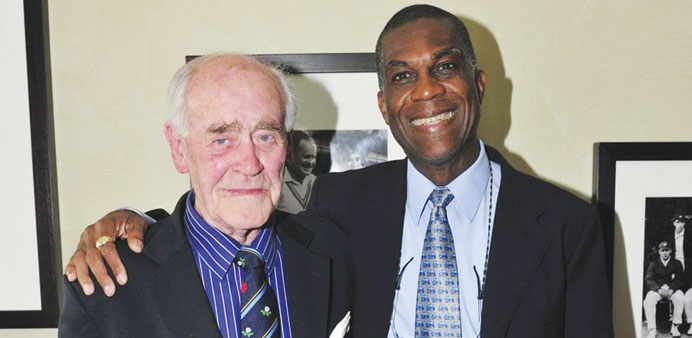Former Yorkshire and England cricket captain Brian Close (L) poses with former West Indies cricketer Michael Holding (R) on June 21, 2012.
AFP/London
Former Yorkshire and England captain Brian Close, one of the most physically courageous players in cricket history, has died at the age of 84, it was announced yesterday.
Close became the youngest player ever to win a Test cap for England when he made his debut against New Zealand in 1949 as an 18-year-old.
He went on to lead his country seven times in 22 Tests, between 1949 and 1976 and also captained his native county to win four county championship titles.
Close scored almost 35,000 runs as a batsman, including 52 centuries with a highest innings score of 198. He also took 1,171 first-class wickets as an off-spin bowler and over 800 catches as a fielder.
A member of the outstanding Yorkshire team of the 1960s which also featured England greats such as Geoff Boycott, Ray Illingworth and Fred Trueman, Close returned home to Baildon near Bradford more than 20 years later to lead Yorkshire’s Academy team - and also serve as chairman of the cricket committee.
His death, after a short illness, came just four days after Yorkshire sealed their second successive county championship title - and 32nd outright in all.
A statement on Yorkshire’s website yesterday morning confirmed Close’s death the previous day.
It read: “It is with the deepest regret that Yorkshire County Cricket Club announce the death of Brian Close, CBE, one of Yorkshire and England’s greatest ever captains and one of the game’s most courageous players.”
Close was renowned for his fearlessness, both in the ‘suicide’ catching positions where, in an age before helmets and extensive protective equipment, he would be much nearer than modern-day fielders, and in standing up to fast bowling.
His capacity for taking bruises, be it against the likes of Wes Hall and Charlie Griffith in 1963 or 13 years later when, at the advanced age of 45, he was recalled by England to face the searing pace of another pair of West Indies fast bowlers in Andy Roberts and Michael Holding, won him both awe and admiration.
Close, who also briefly played professional football for Leeds and Bradford, had a stop-start England career, with injury on the 1950/51 tour of Australia being held against him before, a decade later, he was accused of sparking an Ashes Test defeat by Australia at Old Trafford in 1961 when he got out trying to counter-attack Australia leg-spinner Richie Benaud.
He was recalled by England as captain in 1966 but, after a successful spell in charge, lost the job a year later after being accused of time-wasting in a county match.
After he was controversially sacked by Yorkshire in 1970, Close moved to Somerset where, as captain, he had a major role in supervising the early professional careers of two future world stars in England all-rounder Ian Botham and West Indies batsman Vivian Richards.
His professional career lasted 37 years—unthinkable by modern standards—and, when it was over, he also had a spell as an England selector.
Former umpire Dickie Bird, who played alongside Close at Yorkshire, said: “He will go down as one of the bravest cricketers of all time. He would stand at short-leg, about a yard away from the bat, and would never flinch if the ball hit him.
“As a captain, his record speaks for itself. He is Yorkshire’s most successful post-war captain—winning the County Championship on four occasions—and will always be regarded as one of the best skippers in the game.”
Meanwhile Michael Vaughan, who also played for Yorkshire and captained England to Ashes glory in 2005, remembered how Close had advised him early in his career.
Writing on Twitter, Vaughan said: “Such a sad day.. He was a true inspiration to all of us ...I once had a LBW problem.Closey aged 60 came into the nets and batted without pads ‘only way young man you will sort your problem’ #RIPClosey” .

